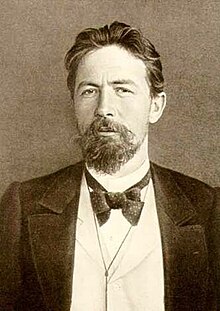The new country house (Chekhov)
Das neue Landhaus ( Russian: Новая дача , Nowaja dacha ) is a short story by the Russian writer Anton Chekhov , which appeared on January 3, 1899 in the Moscow daily Russkije vedomosti .
The Moscow engineer Kutscherow is building a railway bridge about three kilometers from the farming village of Obruchanowo over the wide, calmly flowing river. The wife Jelena Ivanovna visits the engineer together with the little daughter. Because the woman so likes the wooded river landscape around the village, Kutscherow buys land and has a house built on it within three months. The one-story building with a terrace, balcony and tower is now called the new country house in Obrutschanowo. The Kutscherows move in. A guerrilla war begins between the long-established villagers and the Moscow engineering family. A couple of horses and a bull Kutscherows are causing damage to the fields in and around Obruchanowo. The Obruchanowoers return the favor. The shepherd simply drives his flock through Kutscherow's carefully and artfully laid out gardens over months of detailed work. Bridle and pliers are stolen from the engineer. The engineer then gives the farmers no more work. Then the stolen property is secretly returned. The quarrels never end. Early in the morning, girls from the village of the Kutscherows collect all the mushrooms that have grown overnight on their premises. The Kutscherows have the weaker nerves during the bickering. You sell the property and house to a collegiate secretary who, as the proud new owner, basically overlooks the farmers who greet them.
The Obruchanovians cannot answer one question. Why do they get along with the new owner, this inflated official who comes by for a go on Sundays, and why do they not get along with the engineer? A certain farmer Volodjka (who slaps his wife as soon as she protests and then gets drunk in the tavern) knows the answer: "We lived without a bridge, we don't want any and don't need them."
German-language editions
Output used:
- The new country house , pp. 27–41 in Anton Chekhov: Happiness and other stories. Translated from the Russian by Alexander Eliasberg . 187 pages. Wilhelm Goldmann Verlag, Munich 1962, Goldmann's yellow paperbacks, vol. 868
Web links
- The text
- online in the Gutenberg-DE project
- Новая дача (Чехов) (Russian)
- online in FEB (Russian)
- Chekhov Bibliography, Entry Stories No. 566 (Russian)
- Notice of first publication in the Labor der Fantastik (Russian)
- Entry in WorldCat
